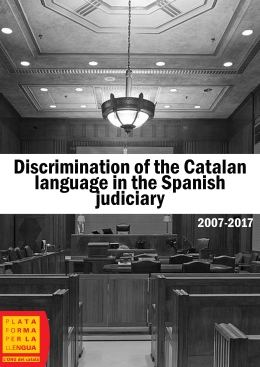Spanish mainstream media have recently censured Catalan President Puigdemont's decision to have his European arrest warrant trial in Belgium conducted in the Dutch language, fearing Flemish judges might be more sympathetic to his cause than French-speaking ones would be (the reason for his language choice was simpler: the President's lawyer is a Dutch speaker). Plataforma per la Llengua cannot but condemn the attack by Spanish media, including its main public broadcaster (TVE) against the judicial independence of Belgian judges on linguistic grounds. Furthermore, Plataforma per la Llengua believes the Spanish media attitude unmasks a very disturbing mind-set, that of Castilian linguistic supremacism and the political and judicial institutions it controls.
Like Spain, Belgium is a multilingual state. However, unlike Spain, Belgium is very respectful of its different language communities: both French speakers and Dutch speakers can address and interact with the state's institutions in their own languages, which are equally official. Citizens can choose what language they want to use at court and in any other public space, and no member of a Belgian linguistic community has any obligation to address public authorities in the language of another. In Spain the opposite is true: Castilian (most widely known as Spanish) is the sole official state language and Catalan is only partially official in its own lands and regarding regional and local authorities. Catalans do not have an individual right to address institutions that have power over their lives in their own language if their headquarters are not located in Catalonia. As the court system is centralised, Spanish is the only language all judges must understand (even in Catalan-speaking territories) and it is Catalan citizens who must adapt to their needs and not the other way around, something which constitutes a perverse reversal of the roles of the citizen and the civil servant.
That Belgium and Spain differ so much as far as language rights are concerned is no coincidence. Belgium is an advanced democracy that places great emphasis on pluralism and equality. Spain, on the other hand, came out of its transition from Francisco Franco's dictatorship with its elites and bureaucracy intact. The Spanish legal framework is very nationalistic: supremacy of Spanish is seen as inevitable and the rights of citizens and national minorities are secondary. This legal framework keeps Catalans and other minority nations alienated from the state but at the same time ensures the adherence of the bulk of the Castilian population, which constitutes a majority within Spain. Obviously, the system cannot work properly if bureaucrats are not imbued with its underpinning principles. That is why there is such widespread distrust of the Spanish judiciary (and state institutions in general) among national minorities and why denunciations of its linguistic abuses are constant but never properly investigated or dealt with. When Spanish media are suspicious of Belgian justice being served in Dutch, they are basically doing self-projection: they are admitting the Spanish judiciary is neither independent nor fair to Catalan speakers.
Below, you can read 22 instances of judicial discrimination against Catalan speakers between 2007 and 2017. It is not a comprehensive list: many cases are not publicly denounced and in many situations repression of linguistic rights happens without overt aggression. However, the cases presented are significant enough for an informed reader to see that the situation of the Catalan language in Spain's justice system is neither normal nor right.




